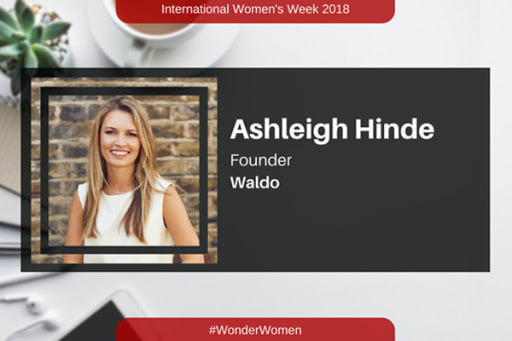Ashleigh Hinde is the founder of ecommerce start-up Waldo, which delivers high-quality, affordable daily contact lenses straight to the customer’s door.
Ashleigh grew up in South Africa, studied at Harvard, and has since set up her business in London. Having launched last August, Waldo now has 10,000 customers, and is about to announce expansion outside of the UK.
Can you give us some background on Waldo? Where did you come up with the idea? How did you begin?
I have worn contacts my whole life, so they’ve been the starting point to my day for a long time and I have always been frustrated by their cost and the hassle of buying of them. While I was completing my master’s I decided to look into the industry further, and found that really complicated distribution channels and greedily high margins taken at every point in the distribution cycle meant contact lens wearers were losing out to big pharmaceutical companies.
It made me frustrated – for many people, contact lenses are a necessity. After months of investigation and product testing with opticians, I found world-class suppliers who were able to create great quality contact lenses. By going directly to the customer, we can sell a high quality product for significantly less than other brands of the same standard while really focusing on customer service and ensuring the experience for the customer is the best it can be.
What was it like growing up in a family of entrepreneurs? Do you have any advice for anyone else in that kind of situation?
Consistent working and persistence were very much the norm. Generally we were expected to be very independent and discerning from a young age because of it and often helped out in the office with small tasks. We are a very close family and they have been a brilliant sounding board for me launching Waldo, and the best support system I could have asked for, particularly in the beginning stages.
You were told that you would “go further” if you brought on a male co-founder – what was the motivation behind that, and how did you handle it?
Quite simply, they wanted Waldo to succeed. If you look at the current make-up of funded start-ups – Fortune reported only 2.2% of venture capital funding went to women led companies – it’s not surprising they thought Waldo would be more successful with a male co-founder.
I handled it by asking why they felt that way and broadening my understanding of the context; and then considered it. However ultimately I disagree with giving into that equality bias and if I was going to bring on a co-founder or any member of the team, man or woman, it would be because of their skills and attitude; certainly not their gender.
What advice would you give aspiring entrepreneurs looking to start their own brand?
My former professor at Harvard once told me to never underestimate people’s willingness to share their knowledge. I think this is an extremely valuable piece of advice. People in business, regardless of the industry they are in, should ask others for help and advice.
I have found that women especially often refrain from reaching out, much more so than men, but from my own experience I have found that asking for advice from people in their area of expertise to be very powerful.
And finally, what does International Women’s Day mean to you?
International Women’s Day is a great way to celebrate all the roles women take on as business women, mothers, leaders, and nurturers; and the amazing things women are accomplishing around the world.
Women have come a long way in a short space of time to fight for equal rights, and while we have a long way to go, IWD is a necessary day to reflect on feminism, celebrate it, and continue pushing forward.


